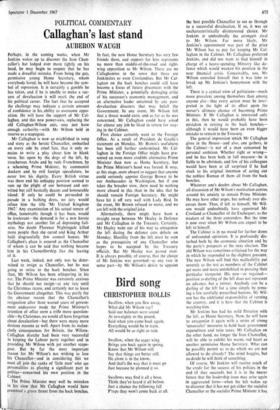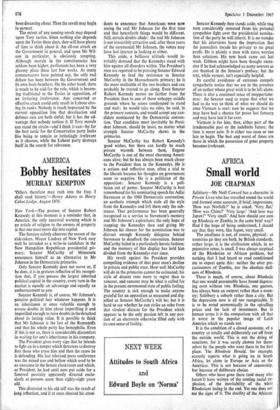Callaghan's last stand
POLITICAL COMMENTARY AUBERON WAUGH
Perhaps, in the coming weeks, when Mr Jenkins- wakes up to discover the Iron Chan- cellor's hat lodged ever more tightly on his head, he may begin to suspect that he has made a dreadful mistake. From being the gay, permissive young Home Secretary, whom everybody loved, he will have become the sym- bol of repression. It is certainly a gamble he has taken, and if he is unable to make a suc- cess of devaluation it will mark the end of his political career. The fact that he accepted the challenge may indicate a certain amount of confidence in his ability to overcome oppo- sition. He will have the support of Mr Cal- laghan, and this new power-axis, replacing the old Callaghan-Wilson axis, may just have enough • authority—with Mr • Wilson held in reserve as a scapegoat.
Mr Callaghan is now so established in song and story as the heroic Chancellor, embattled on every side by cruel fate, that it only re- mains to write a play about him in blank verse. Set upon by the dogs of the left, by treacherous Arabs and by rude Frenchmen, by a scheming Prime Minister, by communist dockers and by evil foreign speculators, he never lost his dignity. Every British virtue was there and his unhappy position seemed to sum up the plight of our bemused and out- witted but still basically decent and honourable island. If only he could be persuaded to parade in a bathing dress, no jury would refuse him the title `Mr United Kingdom 1967.' Any examination of his actual tenure of office, lamentable though it has been, would be irrelevant—the demand is for a new heroic mythology not another list of depressing fail- ures. No doubt Florence Nightingale killed more people than she cured and King Arthur built disgracefully few council houses. Mr Callaghan's place is assured as the Chancellor of whom it can be said that nothing became him in his Chancellorship like the leaving of it.
Last week, indeed, not only was he deter- mined to resign as Chancellor, but he was going to retire to the back benches. Since then, Mr Wilson has been whispering in his ear. The Prime Minister was extremely anxious that he should not resign—at any rate until the Christmas recess, and certainly not to leave the Government altogether. This was partly for the obvious reason that the Chancellor's resignation after three wasted years of govern- ment endeavour made the Prime Minister's retention of office seem a trifle more question- able—by Christmas, we would all have forgotten about devaluation—but there were many more devious reasons as well. Apart from its melan- choly consequences for Britain, the Wilson- Callaghan diarchy had been very successful in keeping the Labour party together and in providing Mr Wilson with yet another scape- goat. But by far the most important reason for Mr Wilson's not wishing to lose his Chancellor—and in considering this we must all join the ranks of 'little men' who see personalities as playing a significant part in politics—concerned hii own position in the Cabinet.
The Prime Minister may well be mistaken in his view that Mr Callaghan would have presented a grave threat from the back benches. In fact, the new Home Secretary has very few friends there, and support for him represents no more than middle-of-the-road and right- wing opposition to Mr Wilson. There are no Callaghanites in the sense that there are Jenkinsites or even Croslandites. But Mr Cal- laghan on the back benches could still have become a focus of future discontent with the Prime Minister, a potentially damaging critic of his successor's economic management, and an alternative leader untainted by any post- devaluation disasters that may befall the Government. In any event, Mr Wilson felt that a threat would exist, and as far as he was concerned, Mr Callaghan could have asked for almost any job he liked in return for stay- ing in the Cabinet.
First choice certainly went to the Foreign Office. As a result of President de Gaulle's statement on Monday, Mr Brown's usefulness has been still further undermined. Mr Cal- laghan in the Foreign Office alight have pre- sented an even more credible alternative Prime Minister than now as Home Secretary, but the Prime Minister's hand was forced. It may, at this stage, seem absurd to suggest that anyone could seriously appoint George Brown to be our Ambassador in Washington, but if one takes the broader view, there need be nothing more absurd in this than' in the idea that he should remain Foreign Secretary. He might have hit it off very well with Lady Bird. In the event, Mr Brown refused to move, and we are left with the original joke.
Alternatively, there might have been a straight swap between Mr Healey in Defence and Mr Callaghan in the Treasury. Certainly, Mr Healey went out of his way to antagonise the left during the defence cuts debate on Monday. Hostility from the left must be seen as the prerequisite of any Chancellor who hopes to be accepted by the Treasury officials. But Mr Healey was passed over. It is always possible, of course, that the choice of Mr Jenkins was governed—at any rate in some part—by Mr Wilson's desire to appoint the best possible Chancellor to see us through to a successful devaluation. If so, it was an uncharacteristically disinterested choice. Mr Jenkins is undoubtedly the strongest rival to Mr Wilson. Far more likely, Mr Jenkins's appointment was part of the price Mr Wilson has to pay for keeping Mr Cal- laghan in the Cabinet. Mr Callaghan preferred Jenkins, and did not want to find himself in charge of a heavy-spending Ministry like de- fence which would weaken his position in the next financial crisis. Conceivably, too, Mr Wilson consoled himself that it was time to break up Mr Jenkins's honeymoon with the left.
There is a cynical view of politicians—much more prevalent among themselves than among anyone else—that every action must be inter- preted in the light of its effect upon the mover's ultimate chance of becoming Prime Minister. If Mr Callaghan is interested only in this, then he would probably have been mistaken in retiring to the back benches— although it would have been an even bigger mistake to remain in the Treasury.
The general impression which Mr Callaghan gives in the House—and also, one gathers, in the Cabinet—is not of a man consumed by personal ambition. Whether right or wrong— and he has been both in full measure—he is liable to be obstinate, and few of his colleagues would have been at all surprised if he had stuck to his original intention of acting out the noblest Roman of them all from the back benches.
Whatever one's doubts about Mr Callaghan, all discussion of Mr Wilson's motivation centres around his anxiety to remain Prime Minister. He may have other urges, but nobody ever dis- cusses them. Thus, if left to himself, Mr Wil- son would undoubtedly have appointed Mr Crosland as Chancellor of the Exchequer, as the weakest of the three contenders. But the time is now over when Mr Wilson can expect to be left to himself.
The Cabinet is in no mood for further doses of unfounded optimism. It is profoundly dis- turbed both by the economic situation and by the party's prospects at the next election. The old Wilson was sometimes criticised for the way in which he responded to the slightest pressure. The new Wilson will find this malleability put severely to the test as members of the Cabinet get more and more uninhibited in pressing their particular viewpoint. His new—or regained— position as darling of the left does not represent an advance, but a retreat. Anybody can be a darling of the left for a time simply by press- ing a few carefully prescribed buttons. Mr Wil- son has the additional responsibility of running the country, and it is here that the Cabinet is watching him.
Mr Jenkins; has had his mild flirtation with the left, as Home Secretary. Now, he will have to antagonise it again with a series of strong • unsociatise measures to hold back government expenditure and raise taxes. Mr Callaghan on the other hand, no longer the Iron Chancellor, will be able to exhibit his warm, red heart as another permissive Home Secretary. What can he possibly permit us to.do which we are not allowed to do already? The mind boggles, but no doubt he will think of something.
Of course, Mr Jenkins will receive much of the credit for the success of his policies in the .end (if they succeed), but it is in the nearer future that the leadership issue may arise again in aggravated form—when the left wakes up to discover that it has not got either the socialist Chancellor or the socialist Prime Minister it has been dreaming about. Then the revolt may begin in earnest.
The extent of any coming revolt may depend upon Tory tactics. Since nothing else depends upon the Tories these days, they will have plenty of time to think about it. An all-out attack on the Government-in general, and upon Mr Wil- son in particular, is obviously tempting. Although morale in the constituencies has seldom been higher, parliament has been a very gloomy place these last few weeks. As many commentators have pointed out, the only real debate has been between the Government and its own back-benchers. On the other hand, there is much to be said for the role, which is becom- ing traditional to the Tories in opposition, of an irritating irrelevance. Any concerted or effective attack could only result in Labour clos- ing its ranks. Nobody is much impressed by the current opposition line that devaluation and defence cuts are both sinful, but it has the ad- vantage that nobody notices it. If Tory morale can stand the strain—and I think it can—by far the best tactic for the Conservative party looks like being to remain as irritatingly irrelevant as it chooses, while the Labour party destroys itself in the search for relevance.



































 Previous page
Previous page